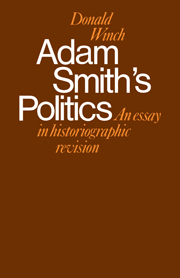Book contents
- Frontmatter
- Contents
- Acknowledgements
- Abbreviations
- 1 Introduction: the problem – the liberal capitalist perspective
- 2 Republicanism and sceptical Whiggism
- 3 Hutcheson and Smith: Real Whig versus sceptical Whig
- 4 Commerce, liberty and justice
- 5 Martial spirit and mental mutilation
- 6 A ruinous expedient
- 7 The present disturbances
- 8 Conclusion
- Bibliography
- Index
- Title in the series
7 - The present disturbances
Published online by Cambridge University Press: 03 February 2010
- Frontmatter
- Contents
- Acknowledgements
- Abbreviations
- 1 Introduction: the problem – the liberal capitalist perspective
- 2 Republicanism and sceptical Whiggism
- 3 Hutcheson and Smith: Real Whig versus sceptical Whig
- 4 Commerce, liberty and justice
- 5 Martial spirit and mental mutilation
- 6 A ruinous expedient
- 7 The present disturbances
- 8 Conclusion
- Bibliography
- Index
- Title in the series
Summary
In spite of the fact that Smith consistently chose to refer to the American Revolution simply as the ‘present’ or ‘recent disturbances’, we have good reason to believe that it meant much more to him than this flat description implies. During the three years which he spent in London prior to the publication of the Wealth of Nations we know that he was ‘very zealous in American affairs’. Indeed, he may even have delayed publication in order to complete those parts of his general treatment of colonies which contained his views on the causes of American revolt and his remedies for dealing with its consequences. We also know that Smith chose not to follow the advice of his friend, Hugh Blair, to omit the passages dealing with American affairs from future editions ‘when public measures come to be settled’. Smith clearly did not accept Blair's view that they made the book seem ‘too much like a publication for the present moment’. And yet in the light of the curious fact that Smith was fairly unusual among his contemporaries, certainly among the more purely economic writers, in not writing a single topical pamphlet at any stage of his career, it is unlikely that he was simply responding to an opportunity to incorporate his views on an urgent matter of public concern. Hence, while the sections dealing with American affairs clearly owe a good deal to the circumstances ruling in i 773–6, it is consonant with what we know of Smith's attitude to the role of the philosopher in public affairs to suspect that he had a didactic (but non-polemical) purpose in mind.
- Type
- Chapter
- Information
- Adam Smith's PoliticsAn Essay in Historiographic Revision, pp. 146 - 163Publisher: Cambridge University PressPrint publication year: 1978
- 1
- Cited by

